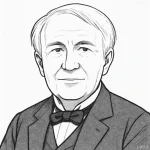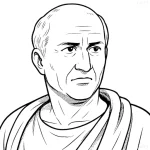“No one was ever great without some portion of divine inspiration.”

- January 3, 106 BC – December 7, 43 BC
- Roman
- Orator, Philosopher, Statesman, Lawyer, Author
table of contents
Quote
“No one was ever great without some portion of divine inspiration.”
Explanation
This quote suggests that true greatness—whether in art, leadership, philosophy, or virtue—requires more than talent or effort alone. Cicero claims that a spark of something beyond the human, something divine or transcendent, is necessary for a person to rise above the ordinary. This “divine inspiration” is not necessarily supernatural intervention, but rather a kind of elevated vision, moral clarity, or creative genius that sets great individuals apart from the rest.
Cicero, steeped in Roman religious and philosophical traditions, often blended reason with reverence for the divine. Influenced by Platonism and the Stoics, he believed that human beings participate in a larger, rational cosmic order, and that those who achieve greatness do so in harmony with divine reason or providence. This quote reflects his belief that excellence cannot be fully explained by human means alone, but must involve some connection to higher purpose or insight.
In the modern age, this idea remains compelling across fields. We often speak of “visionaries,” “genius,” or “calling” to describe people who achieve the extraordinary. Cicero’s insight reminds us that greatness is not merely mechanical or calculable—it involves a depth of soul, a touch of the ineffable, something that elevates human effort into lasting achievement. Whether viewed spiritually or metaphorically, divine inspiration remains a vital element in our understanding of true greatness.
Would you like to share your impressions or related stories about this quote in the comments section?




